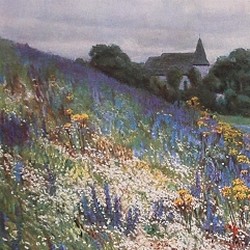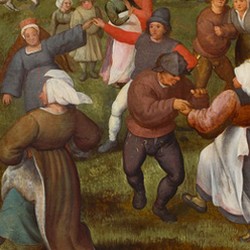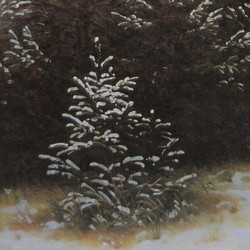
After Ein Jüngling liebt ein Mädchen, Dichterliebe's song no. 11, in which the poet tells us, even with humour, what exactly happened with his beloved, Am leuchtenden Sommermorgen [One bright summer morning] arrives, and the tone of the cycle changes again.
Now, the poet strolls through a garden. So far, nothing new has happened. The flowers have accompanied him throughout the cycle, they have been their confidants, they have listened to their sorrows without a word. However, he introduces something new in the first stanza of the poem: the flowers whisper, and he keeps quiet. In the second and last stanza, we hear what the flowers say to him: “Don't be angry with our sister.” But they aren't concerned about her sister, the beloved, no; they're worried about him. And we know it because he tells us that they look at him with pity and call him a sad, pale man. In other words, the flowers' insightful message to him was: “Look at you, if you keep doing this, you'll get sick. Let go of all the bitterness that you denied in Ich grolle nicht (of course, we didn't believe you), as it is not aiding you. Forget about her and free yourself.” But they tell him in the concise and precise way of Heine.
The song Schumann writes with this poem is a beauty, intimate and meditative. It starts ziemlich langsam [quite slow] and piano, and this will not change until the flowers speak in the last two verses, then it will become langsamer [slower] and pianissimo. It is just thirty bars long; like so many other Dichterliebe Lieder, it passes in a breath. It appears to be a strophic Lied, the second stanza begins and repeats the music of the first one, until after the first two verses (similar to last week's song) the music changes, and it does so because we no longer hear the voice of the poet but the voice of the flowers. Twenty bars have passed by; the last ten are for a postlude that keeps us as inside a story (because it doesn’t happen every day that flowers speak to us).
In fact, the piano plays a significant role in this song. A descending figure traverses from end to end, lower or more acute, and refers us to two moments in the cycle. We heard one of them, it is the first song, Im wunderschönen Monat Mai; the piano creates an atmosphere very similar to that of the beginning of the cycle, and it links this bright summer morning with that magnificent month of May that is now so far away; we find the parallelism even in the titles of the songs. The other moment in the cycle, to which this song refers us has yet to arrive, is the end: the long postlude anticipates the postlude that will close the cycle. It is as if Schumann was suggesting that the poet would leave behind the disappointment that hurt him so deeply.
We are on the right path, indeed. The next song, which talks about dreams, will make us aware: in an avant la lettre Freudian experience, the poet will tell us the dreams that will help him to keep on healing. But, for the moment, we stop to listen to Am leuchtenden Sommermorgen, performed by Jose van Dam and Dalton Baldwin.
Am leuchtenden Sommermorgen
Geh’ ich im Garten herum.
Es flüstern und sprechen die Blumen,
Ich aber wandle stumm.
Es flüstern und sprechen die Blumen,
Und schau’n mitleidig mich an:
„Sei unsrer Schwester nicht böse,
Du trauriger, blasser Mann.“
Please follow this link if you need an English translation
















